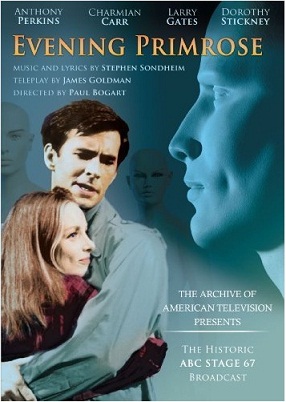The 1966 television musical Evening Primrose is not a lost masterpiece, but it certainly hasn't deserved its four and a half decades of obscurity, either.

Presented as part of the short-lived ABC anthology series ABC Stage 67, this adaptation of a John Collier short story hasn't been available for viewing outside of bootlegs or museums since its initial broadcast. ABC never presented it again. It was never syndicated nor released on VHS, much less Blu-Ray or DVD. That hasn't stopped legions of curious fans from being eager to see what it was like.
Much of the fascination is due to the fact that Evening Primrose features four vintage tunes from Broadway songwriter Stephen Sondheim (Sweeny Todd, Assassins) and was adapted by playwright and screenwriter James Goldman (They Might Be Giants, The Lion in Winter). The two later collaborated on Follies.
It also stars Anthony Perkins and The Sound of Music's Charmain Carr, who are terrific in somewhat atypical roles. In this case, the amiability Perkins projected as Norman Bates in Psycho doesn't hide a darker interior. Instead, he plays Charles Snell, a frustrated poet who really is too naïve to get through life in New York.
Suffering from writer's block and crippling expenses, Charles hides out in a department store after closing hours so that he can write without any distractions from the bustling city. He quickly discovers he isn't the only person who's had that idea.
An aged woman named Mrs. Monday (Dorothy Stickney) has been leading a whole society of squatters for decades. Leery of outsiders, her followers, who are all around her age, are reluctant to take him in. The only resident under 50, much less 30, is Ella (Carr), a handmaiden, whose parents left her in the in the store. Unlike Charles, she wants back into the world.
Because both are innocents, it's only a matter of time before they fall in love. Mrs. Monday doesn't approve. If the bumbling nightwatchmen don't catch them, she can summon a mysterious group known as the Dark Men, who can do more than simply kick them out of the store.
Sondheim's stage musicals have often eschewed the romantic comedy restraints that have been placed on the genre and frequently play more like thrillers or even Grand Guignol. Because this grim, Twilight Zone-like story is a musical, it's actually easier to suspend disbelief because the characters are already bursting into loud song without alerting security. Because the world is already stylized, what follows becomes convincing.
While Perkins wasn't known for his singing (he actually recorded three albums), his voice is actually quite good, and he and Carr are appealing together. In a bonus interview, director Paul Bogart admits the film suffers from a limited budget, which muted the eerie atmosphere he was trying to achieve. There are also some jarring continuity errors (Perkins' scarf appears and disappears awkwardly) that had to stay in because Bogart didn't have the money or time for reshoots.
Another obstacle was the fact that Macy's backed out of cooperating with the production for fear that customers might think their security was negligent. The Stern Brothers chain stepped in, but they're now defunct, so Macy's might have been onto something.
Although Evening Primrose was shot in and broadcast in color, the only available recordings of it are in grainy black-and-white. Strangely, this is a plus because it makes the production look creepier than it might have in its original form. When the Dark Men eventually show up, their silhouettes look suitably menacing. If you want to get glimpse of what Evening Primrose might have looked like, the DVD includes color outtakes of Perkins wandering though Macy's before the most of the principal footage was shot.
The booklet that accompanies the DVD is full of juicy info and a statement for Sondheim. It's refreshing that both he and Bogart believe Evening Primrose is flawed. It's better to hear two clearly accomplished artists admit how they could have done better than to listen to hacks describe a masterpiece that's not evident in the final work. At least the former's soaring tunes and the latter's sincere approach make unearthing this DVD worthwhile.
